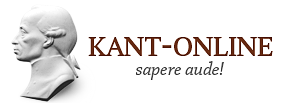Kantian Rationality Lab Conferences
Kantian Rationality in Philosophy of Science, October 9-11, 2020, online
Kant’s notion of reason or rationality as related to the sciences is multifaceted. For instance, reason provides certain “ideas” for scientific research and for the integration of its results; it has methodological functions in theoretical explanation, experimentation (including thought experiments), or mathematical proof. Moreover, reason is the source of the “form” and “matter” of the so-called Vernunftwissenschaften, such as logic, mathematics, metaphysics, and pure natural science, but also plays theoretical roles in empirical sciences such as history and anthropology. In addition, reason guides the structured classification or “architectonic” of all sciences into one complete and consistent system. This diversity of aspects and activities of reason for the sciences needs to be understood; and one equally well needs to ask what, if anything, unifies that rich diversity. Last but not least, the conference also aims to take a fresh look at Kant’s impact for accounts of scientific rationality up until today. How has the concept of such rationality developed after Kant? Where did he have an influence, and where did new assumptions and agendas emerge and why? Where can current debates still profit from Kant’s account?
Kantian Rationality in Ethics, May 14-16, 2021, online
Kant famously claims that reason is the foundation of morality. This is primarily a statement about the justification of the basic principles of ethics, but it has important implications for applied ethics as well. While Kant views the rational foundations of ethics as immutable – a contested view – there is little if any doubt that applications of his theory can develop as societal challenges develop. Some of the topics and problems to which Kant himself applied his theory are still pressing issues today, such as religious conflict, the foundations of democracy and the rule of law, or international politics; yet, they have changed in many ways. In addition, recent Kantian contributions to applied ethics have illustrated how his account can speak to problems that have emerged only more recently, such as questions of global justice in a highly interconnected world, the destruction of the environment, climate change, or problems that new technologies create for the rights of individuals, for instance to privacy. Studies of these problems have shown that a Kantian ethics centered on reason allows for high degrees of domain-specific applications and adaptability.
Kantian Rationality in the Project of the Enlightenment, October 15-17, 2021, online
Kant clearly thinks that the power of reason can and ought to play a central role in education of new generations and in the Enlightenment that is still a vital social project of today. But how can and should his famous demand to “think for oneself” be strengthened in today’s world? What strategies of teaching promote adequate reasoning or critical thinking skills, and thereby help to cope with information overload, populism and propaganda, or strengthen the authority of science, the rationality of society and democracy? When should the teaching of norms of both epistemic and moral rationality start, with what methods, and how long does it take for such education until such norms become sufficiently internalized? How does teaching such norms and skills differ from other areas of education? Can such education make possible a “New Enlightenment”, and what shape should it take? How does philosophy in these areas relate to empirical science? The conference aims to present and critically discuss Kantian perspectives on these and related issues.
Ideas in Kant’s Transcendental Philosophy, December 17-18, 2021, online
At the end of the 18th century, the concept of idea underwent a fundamental change in meaning, largely due to its use in Kant’s transcendental philosophy. After ‘idea’ had become a synonym for any content of consciousness (representation) in early modern philosophy, Kant redefined and restricted its meaning in an independent way. In the Transcendental Dialectic of the Critique of Pure Reason, ideas are discussed in two ways. First, Kant refutes an illegitimate “transcendental” use of ideas and, second, introduces a legitimate, “immanent”, and more specifically “regulative” use by means of which “the systematic of cognition, i.e., its interconnection based on one principle” (A 645/B 673), is developed. Moreover, in the Teleological Judgment of the Critique of the Power of Judgment, Kant takes up again the concept of a “natural purpose” as an “idea of a whole” (KU AA V, 373), which serves as a regulative-heuristic concept. From the regulative use of ideas Kant distinguishes the practical use, which, in contrast, is objectively valid insofar as with them reason really brings forth what its concept contains (A 328/B 384–5). Accordingly, if what was originally conceived is realized through practical action, the practical idea gains objective validity by virtue of the realization of an action. These and other different concepts of idea (such as postulates, aesthetic, political, religious, and architectonic ideas) are spread throughout Kant’s works, including smaller writings, such as Idea for a Universal History with a Cosmopolitan Purpose (1784), What Does it Mean to Orient Oneself in Thinking? (1786), The Conflict of the Faculties (1798) etc.

